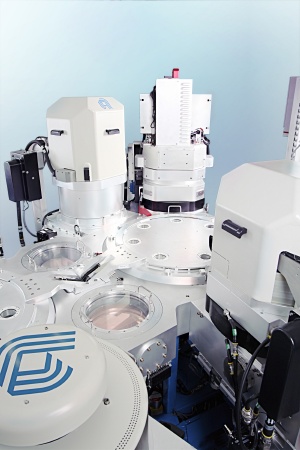Applied Materials, Inc., the global leader in Nanomanufacturing Technology™ solutions with a broad portfolio of innovative equipment, service and software products for the fabrication of semiconductor chips, flat panel displays, solar photovoltaic cells, flexible electronics and energy efficient glass, today launched its Applied Endura® CuBS RFX PVD system, the only copper barrier/seed deposition technology qualified for 32 and 22nm production by logic and flash memory manufacturers. Building on Applied's 10-year leadership in this critical copper interconnect process, the Endura CuBS RFX system extends its proven, cost-effective PVD* technology to provide exceptional step coverage and seed layer integrity - at up to 40% lower cost per wafer than competing technologies.
 The Endura CuBS RFX PVD system delivers exceptional step coverage and seed layer integrity for sub-45nm devices at up to 40% lower cost per wafer. (Photo: Business Wire)
The Endura CuBS RFX PVD system delivers exceptional step coverage and seed layer integrity for sub-45nm devices at up to 40% lower cost per wafer. (Photo: Business Wire)
“Future scaling of copper interconnects depends on finding a reliable, cost-effective way to deposit barrier and seed layers below 45nm,” said Steve Ghanayem, vice president and general manager of Applied Materials’ Metal Deposition and Front End Products Business Unit. “The Endura CuBS RFX PVD system enables customers to extend their existing process flows for another two device generations with robust, production-proven PVD technology, and avoid risk to their production lines that unproven and costly new integration schemes could present.”
Effective barrier and seed layer deposition is critical to assuring the speed and reliability of copper interconnects, since it prevents copper diffusion and provides a quality nucleation layer for subsequent bulk copper fill. Key to the new Endura CuBS RFX system’s high performance is its new EnCoRe™ II RFX Cu seed process chamber. Employing a novel magnetron trajectory and a proprietary ion flux control system to enhance film coverage and morphology, the process delivers smooth, continuous seed layers for void-free copper gap fill and optimized device reliability.
Applied’s breakthrough Endura CuBS PVD system, launched in 1997, enabled a major leap forward in barrier/seed deposition capability by integrating the complete sequence on a single, high-vacuum platform. With almost 500 copper barrier/seed systems in use by the vast majority of copper chip manufacturers worldwide, Applied has demonstrated its ability to extend cost-effective PVD technology over multiple technology generations.
* PVD = physical vapor deposition